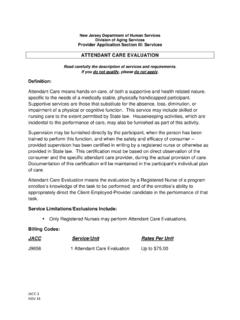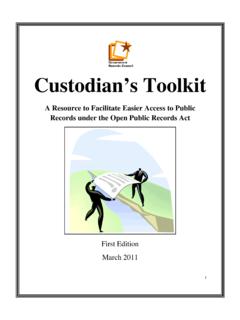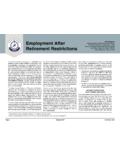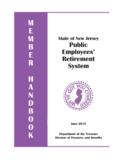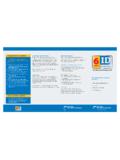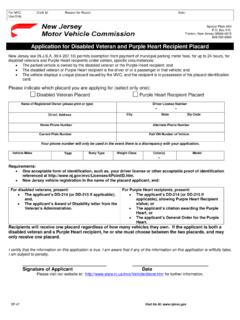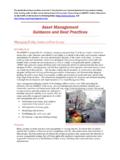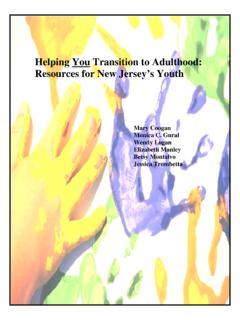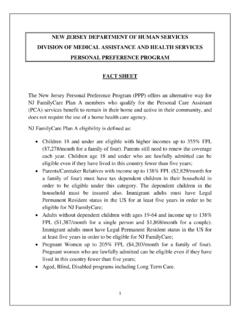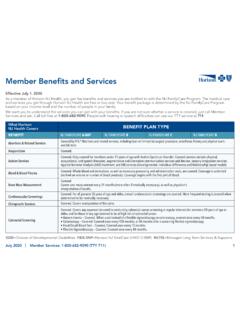Transcription of NJ FamilyCare Aged, Blind, Disabled Programs
1 NJ FamilyCare Aged, Blind, Disabled Programs2021 STATE OF NEW jersey Department of Human Services Division of Medical Assistance and Health Services The NJ FamilyCare Aged, Blind, Disabled (ABD) Programs provides medical coverage to individuals who are age 65 years or older as well as individuals determined blind or Disabled by the Social Security Administration or by the State of NJ. It is designed for people whose income and resources are not enough to meet the cost of necessary care and services. The individual must be a resident of New jersey and a citizen of the United States or Qualified Immigrant. An adult must have Legal Permanent Residence status for at least five years. Income and other countable resources are used to determine eligibility. Countable resources are found inside this brochure under What You Own on Page 7. Covered Benefits Comprehensive and quality services include, but are not limited to: Dental Eyeglasses Doctor Visits Specialist Visits Hospitalization Prescriptions Lab tests and X-rays Rehabilitative Care Mental Health Substance Use Long Term Services and Supports (see Page 5) Services provided by:2 Another option for individuals in need of Long Term Services and Supports in the community, is the Program of All-Inclusive Care for the Elderly (PACE).
2 PACE is only available in certain counties. For more information on the PACE Program, call Security Income (SSI) The Supplemental Security Income (SSI) program, administered by the Social Security Administration, is a federal program that provides monthly payments to eligible individuals who are 65 years of age or older and persons determined blind or Disabled by the Social Security Administration. In New jersey , individuals that are determined to be eligible for SSI automatically receive full NJ FamilyCare ABD Program benefits. An individual may be eligible for SSI in New jersey in 2021 if his/her gross monthly income is equal to or less than $ or $ for a couple (the first $20 per month of income is excluded). The current resource maximum for an individual is $2,000 and $3,000 for a couple. For more information about SSI, or to apply for SSI benefits, please contact the Social Security Administration at 1-800-772-1213.
3 Medicaid Only The Medicaid Only Program is an Aged, Blind, Disabled Program for individuals who do not receive SSI but have income and resources under the SSI standards listed above. New jersey Special Medicaid Programs The New jersey Special Medicaid Programs are for individuals with gross monthly income that is equal to or less than 100% of the Federal Poverty Level which is $1,074 per month for a single person and a resource maximum of $4,000; $1,452 per month for a couple and a resource maximum of $6,000 in 2021. NJ FamilyCare Aged, Blind, Disabled Programs4NJ WorkAbility The NJ WorkAbility Program offers full health coverage to people ages 16-64 with disabilities who are working, to obtain coverage when their gross monthly Social Security Disability Income would otherwise disqualify them from other Programs . Eligibility Criteria Age 16-64 Working full or part-time with proof of employment Determined as Disabled by the Social Security Administration OR the Disability Review Team at the Division of Medical Assistance & Health Services Income and asset eligibility as described below Total Earned Income Potential Includes but is not limited to: wages, self-employment earnings, workers compensation, paid sick leave, private or state temporary disability plan benefits or commissions.
4 If you have no unearned income: - Individual gross earned income may not exceed $65,196 per year/ $5,433 per month. - An eligible couple s gross earned income may not exceed $87,900 per year/$7,325 per month. If you have unearned income (for example, in addition to your wages you also receive alimony), the maximum earned income threshold will vary. Unearned Income Threshold Includes but is not limited to: alimony, Social Security Survivors Benefits through a parent or spouse s work history, unemployment, interest, investments, or trust payments. An individual s unearned income may not exceed $1,074 per month. An eligible couple s unearned income may not exceed $1,452 per month. Asset Threshold: Assets do not include primary home, a car used for work or medical transportation, or 401K/IRA retirement accounts. $20,000 for an eligible individual $30,000 for an eligible couple 5 Long Term Services and Supports (LTSS) LTSS are additional services and supports for people who are determined clinically eligible.
5 Clinical eligibility means that they require assistance with three or more activities of daily living, such as mobility assistance, dressing, bathing, eating and other self-care. These individuals may need nursing home placement or choose to live in their community, such as an assisted living type setting or in their home. LTSS can help people remain in their homes and communities by providing extra services such as, but not limited to, personal care, home-delivered meals, and care management. To qualify for LTSS, an applicant must be both clinically and financially eligible. The local County Welfare Agency will do the financial evaluation using information provided in the Aged, Blind, Disabled Application while the Division of Aging Services is responsible for the clinical eligibility determination for LTSS. The two evaluations are completed concurrently and are coordinated between both agencies.
6 An individual determined clinically eligible by the Division of Aging Services qualifies at a higher income limit of $2,382 per month for a single person with a resource maximum of $2,000 in 2021. In determining financial eligibility, if the gross monthly income exceeds the income limit allowed, he or she can establish and fund a Qualified Income Trust (QIT) with the excess income that is above the limit. More information about a QIT is found on Page 9 under Qualified Income Trust. The financial eligibility process also includes a five year look- back of the applicant s financial accounts and resources to determine if there have been any assets transferred for less than fair market value. To be eligible, a person applying for LTSS must disclose all income and all resources from the past 5 years. Important Note: Portions of both earned and unearned income are not counted when determining eligibility for Workability.
7 Please apply for a full eligibility determination using the NJ FamilyCare Aged, Blind, Disabled Programs Application. Include all relevant information along with your application 6 The NJ FamilyCare Eligibility Determining Agency (EDA) verifies your information. If the EDA cannot electronically verify your personal information, you may be asked to provide proof of identity, age, citizenship and/or marital status. The EDA may also ask for documentation that will prove what you own, how much income you receive, where this income comes from, and how much you spend on living expenses. During the eligibility determination process, the information you provided will be verified. If there is missing information, you will receive a letter. Failure to respond timely to these letters will cause your application to be denied. Income You Receive Income can come from different sources such as a paycheck, pension, or interest from an investment account.
8 Listed below are examples that can prove your income. Income Statement from Employer/Pay Stubs Pension Information Unemployment Benefit Statement Child Support Order Self-Employment Tax Return VA Explanation of Benefits Interest Proof of Rental/Royalty Income Social Security Award Letter Retirement Account Statement Dividends Income from Trust Funds Annuity Payments Workman s Compensation/ Disability SSI Payments Applicants Income, Resources and DocumentationWhat You Own Ownership is not limited to homes and automobiles - it can include cash values of life insurance policies or annuities, trust funds, and many other things. Provide documentation with your application of any of the following items that you own or owned during the past five years: 7 Cash on Hand Bank Accounts Deeds to all Property Owned Certificates of Deposit (CDs) Promissory Notes Annuities Mortgages Equipment/Inventory Automobile/Registrations Other Vehicles (Boat, Trailer, etc.)
9 Holiday/Vacation Club Accounts Property Tax Statements All Life Insurance Policies All Trusts or other Holding Instruments Special Needs Trusts ABLE Accounts Retirement Accounts (403B) Individual Retirement Accounts (IRAs) Business/Real Estate Partnership Papers Burial Accounts/ Funeral Trusts Credit Union accounts Stocks or Bonds Deed to Burial Plots Land/Mineral Rights Keogh Accounts (401K) Contracts Mobile HomeYour Other Documents Copy of health insurance card(s) front and back Designated Authorized Representative Form Copy of any settlements Power of Attorney Guardianship Third Party Signator Court Pleadings * The EDA will verify electronically whenever possible. If the EDA requires more information, you may be asked to provide quarterly statements (or all statements) from the past 5 years, and additional information related to these funds or any other resource.
10 8 Five-Year Lookback on Resources The five-year lookback on all resources is done according to federal regulations. The lookback period checks for any resources that may have been transferred for less than fair market value during the previous five years. Examples of accounts and transactions include: Your Living Expenses How much money do you (and your spouse) need to live in the community each month? The expense of maintaining your house or renting an apartment can account for a large part of your monthly income. The following are examples of expenses to include with your application: Rent Payments Telephone Bills Water / Sewer Bills Health Insurance Bills Mortgage Statements Gas /Oil Bills Real Estate Tax Bills Electric Bills Renter / Home Owner Insurance Checking Accounts Money Market Accounts Savings Accounts Any Transfers/Sales (money or real estate) Credit Union Shares/Accounts Investment Accounts Life Insurance Policies Applicants in need of Long Term Services and Supports (LTSS) may also be required to submit the following information:Qualified Income Trust (QIT) A Qualified Income Trust (QIT), also known as a Miller Trust, is a special legal arrangement for holding a person s income.
